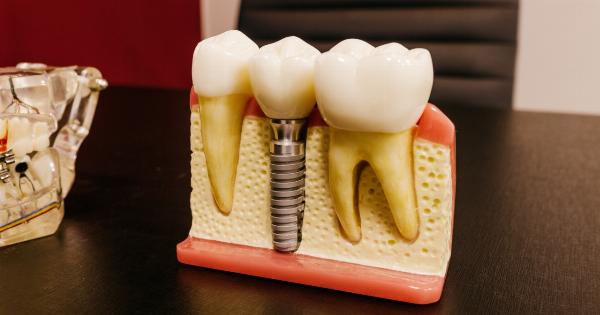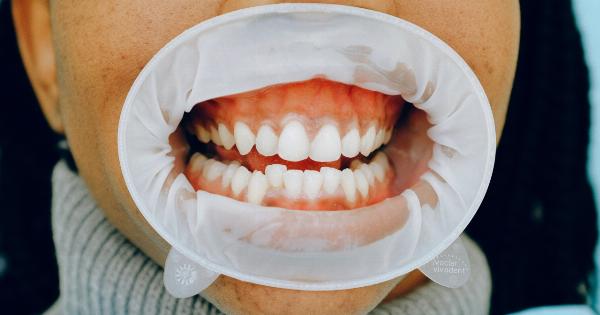Oral ulcers, also known as canker sores, are painful sores that can form inside the mouth. These ulcers can make simple tasks like eating and talking extremely uncomfortable.
While many people may experience occasional oral ulcers, some individuals suffer from chronic ulcers that can significantly impact their daily lives. In this article, we will explore the science behind oral ulcers, including their causes, symptoms, and possible management strategies.
Understanding Oral Ulcers
Oral ulcers typically appear as round or oval sores with a white or yellowish center and a red border. They can develop on the tongue, inside the cheeks, the roof of the mouth, or on the gums.
Most oral ulcers are minor, measuring less than 1 centimeter in diameter, and usually heal within one to two weeks without leaving a scar.
However, some individuals may experience recurrent oral ulcers that can arise multiple times throughout the year. These recurring ulcers can be particularly debilitating and can last for several weeks or even months.
If you frequently experience oral ulcers or if they are large and extraordinarily painful, it is advisable to consult a healthcare professional for an accurate diagnosis and appropriate treatment.
Possible Causes of Oral Ulcers
While the exact cause of oral ulcers is still not fully understood, several factors are believed to contribute to their development. Here are some possible causes:.
1. Trauma or Injury
Accidental biting of the inside of the cheek or tongue, vigorous toothbrushing, or any other form of tissue injury in the mouth can lead to the formation of oral ulcers.
These ulcers usually heal on their own within a week or two, provided no further trauma occurs.
2. Certain Foods or Beverages
Consuming highly acidic or spicy foods, such as citrus fruits, tomatoes, or hot peppers, can trigger the development of oral ulcers.
Additionally, some people may be sensitive to specific food additives, like benzoic acid or sodium lauryl sulfate, which are commonly found in processed foods and oral care products.
3. Nutritional Deficiencies
Research suggests that deficiencies in certain nutrients, including vitamin B12, folic acid, iron, and zinc, can increase the risk of developing oral ulcers.
Maintaining a well-balanced diet rich in fruits, vegetables, and whole grains can help prevent these deficiencies and promote oral health.
4. Hormonal Changes
Some individuals may experience oral ulcers as a result of hormonal changes, particularly during menstruation or pregnancy. Fluctuations in hormone levels can make the oral tissues more vulnerable to injury or inflammation.
5. Immune System Dysfunction
Immune system disorders, such as autoimmune diseases like lupus or Behcet’s disease, can cause recurrent oral ulcers.
In these cases, the immune system mistakenly attacks healthy cells, including those in the mouth, leading to the development of ulcers.
Managing Oral Ulcers
While oral ulcers can be painful and uncomfortable, there are several management strategies that can help alleviate symptoms and promote healing. Here are some effective methods:.
1. Over-the-Counter Pain Relievers
Non-steroidal anti-inflammatory drugs (NSAIDs), such as ibuprofen or naproxen, can help reduce pain and inflammation associated with oral ulcers. These medications are available over-the-counter and can provide temporary relief.
2. Topical Oral Gels or Ointments
Applying topical gels or ointments specifically formulated for oral ulcers can help relieve pain and promote healing. These products often contain ingredients such as benzocaine, hydrogen peroxide, or corticosteroids.
It is essential to follow the instructions provided and use these products cautiously to avoid potential adverse effects.
3. Saltwater Rinse
Rinsing the mouth with warm saltwater can help soothe oral ulcers and aid in the healing process. Dissolve half a teaspoon of salt in a cup of warm water and gently swish the mixture around the mouth for about 30 seconds before spitting it out.
Repeat this process several times a day.
4. Avoid Triggering Foods
If you notice that specific foods or beverages consistently trigger oral ulcers, it is advisable to avoid or limit their consumption. Keeping a food diary can help identify potential triggers and guide dietary adjustments.
5. Stress Management
Stress is thought to play a role in the development of oral ulcers.
Incorporating stress-reducing techniques into your daily routine, such as meditation, deep breathing exercises, or engaging in activities you enjoy, can help reduce the frequency and severity of ulcers.
6. Good Oral Hygiene
Maintaining good oral hygiene practices can help prevent further irritation or infection of oral ulcers. Gently brush your teeth with a soft-bristled toothbrush and use a mild, non-irritating toothpaste.
Avoid aggressive brushing or using oral care products that may contain potential irritants.
7. Visit a Healthcare Professional
If your oral ulcers persist for more than two weeks or if they are exceptionally large and painful, it is recommended to seek professional medical advice.
A healthcare professional can evaluate your symptoms, conduct necessary tests, and provide appropriate treatment options.
Conclusion
Oral ulcers can be a source of discomfort and pain for many individuals. Understanding the possible causes of these ulcers and implementing effective management strategies can significantly improve the quality of life for those affected.
While most oral ulcers heal on their own within a couple of weeks, it is essential to consult a healthcare professional if you experience recurrent or severe ulcers. With appropriate care and management, oral ulcers can be minimized, allowing individuals to enjoy a healthy and pain-free mouth.



























